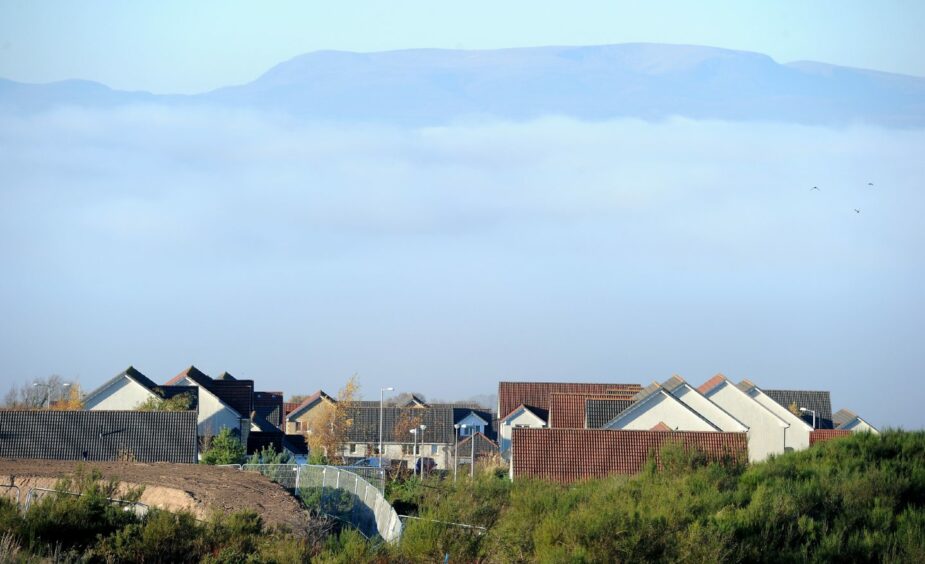The number of properties on the market in Inverness has risen 25% compared to the same month last year as homeowners seek to sell up before a fall in prices, a property firm has said.
The boss of an estate and letting firm in has urged sellers – and buyers – not to “panic” as fears the housing market is due for a correction due to rising mortgage costs and the cost-of-living crisis are overdone.
DJ Alexander chief executive David Alexander said although he believes the housing market will face a correction it will be mild compared to what some “doom-mongers” have forecast as demand remains robust.
The firm said while the number of properties for sale rose in Inverness, it was lower than other areas of Scotland including Glasgow which rose 75% and Edinburgh rose 28%.
Aberdeen was the only outlier as the number of homes on the market fell 10% compared to the same month last year.
He said: “This may seem surprising that at a time when many are predicting a substantial downturn in the market that there should be such an increase in the number of properties advertised. This could be precisely because many sellers are expecting price falls and are trying to sell before this occurs.”
Last week the Bank of England hiked interest rates again to 4% in an effort to reduce inflation. This is expected to add around £50 per month to those who have tracker mortgages and will also add costs to those looking to renegotiate fixed mortgages in what has been a steadily rising cost for home owners since the UK government’s disastrous “mini-budget” last year.
Me Alexander said: “It could also be people who are anticipating a hike in their mortgage payments and are selling before higher payments impact upon them.
“Of course, more properties advertised for sale at any one time usually results in lower prices as supply exceeds demand, but we are finding that the market remains very buoyant despite continued negative forecasts from the doom-mongers.”
Despite another rise in interest rates this month, the Bank of England said that the UK is still headed for a recession, but stressed that the economic downturn could be shallower and shorter than previously expected.
Sellers settle for “realism”
David continued: “There may be a bit more realism among sellers about price setting but there are still a lot of buyers in the market. This is undoubtedly because we have record levels of employment, clear signs that the projected recession is going to be less severe than anticipated, and that inflation appears to be falling already and will be substantially lower by the end of this year.”
“The factors which previously produced a dramatic fall in house prices are largely being addressed by the government and the mood music from the Bank of England has shifted from despair to cheer in a matter of months. Indeed, the statement this week from the Halifax that prices have started to stabilise has once again surprised a market expecting a period of prolonged price falls.”
David continued: “Other factors at play sustaining demand include the fact that many more people are on fixed rate mortgages now which means that current rate rises don’t affect them immediately making it unlikely there will be a sudden jump in the number of homeowners struggling with their payments. The result is that houses are being sold, demand remains reasonably strong, and properties continue coming on to the market.”
Market correction no need for worry
He added that while he believes the Scottish house prices will fall this will be softened by recent rises and will ensure homes remain affordable.
“However, I do still believe that a price correction will occur, and the most recent predictions have been that there may be an 8- 10% fall in prices. Given that average prices in Scotland have risen by 27.1% from March 2020 to November 2022 this is barely a correction. This level of price drop would return average prices to June 2021.
“Although any fall in prices can be alarming to the market if the drop is only 10% against recent increases of 27% then I think we may be needlessly worrying homeowners. A 17% increase over a 33-month period is still a considerable rise in historic terms and such a fall may be needed to maintain affordability as prices have far outstripped wages in recent years.”
Don’t panic
David concluded: “The key message is not to panic, if you were thinking of buying or selling anyway then simply get advice and check out the market. The worst thing to do with property is to try and pre-empt or second guess the future direction of prices. When you try to outthink the property market it almost always ends badly. Much better to take a step back, reflect on your circumstances, and then look at whether now is the time to move or to stay put.”



Conversation